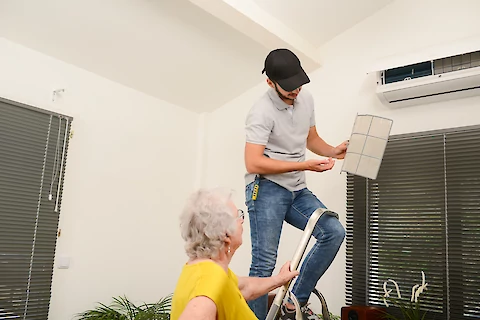
Indoor air quality is an underrated, yet critical component of senior health. Our immune systems and respiratory functions can weaken as we age, making us more susceptible to pollutants commonly found in our homes. Check out this guide on improving indoor air quality for seniors and their caregivers. Learn about the importance of clean air and practical strategies to maintain a healthier living environment.
The Importance of Indoor Air Quality for Seniors
Indoor air quality directly impacts the health and well-being of seniors. Poor indoor air quality can lead to many health issues, from mild irritations like headaches and dizziness to more severe problems like respiratory issues. There may even be exacerbated symptoms of pre-existing conditions such as asthma and allergies. This is particularly alarming for seniors, who may already have weakened immune systems.
Practical Tips on Maintaining and Improving Indoor Air Quality
Give these tips a try to improve and maintain the indoor air quality of your home.
Regularly Change Air Filters
One of the easiest ways to maintain indoor air quality is by regularly changing the air filters in the heating, ventilation, and air conditioning (HVAC) systems. Over time, these filters can collect dust, pollen, and other pollutants that can affect the health of seniors. Ideally, air filters should be changed every 90 days, but if the senior has pets or any respiratory conditions, the filters should be replaced more often.
Use Air Purifiers
Air purifiers can be incredibly effective in improving indoor air quality. They work by trapping small particles and pollutants that can cause health issues, including smoke, dust, and pet dander. For elderly loved ones, an air purifier can reduce the risk of respiratory problems and allergies. There are many types of air purifiers available, so it's essential to choose one that suits the senior's specific needs.
Control Humidity Levels
High humidity levels in a home can promote the growth of mold and mildew, which can contribute to poor indoor air quality. The ideal indoor humidity level should be between 30-50%. Controlling humidity can be achieved by using dehumidifiers, maintaining HVAC systems, and using exhaust fans when cooking or showering.
Encourage Proper Ventilation
Ventilation helps to control air quality by circulating fresh air into a room and letting stale air out. Proper ventilation is not just about opening windows; it can also include using exhaust fans and vents, especially in high-humidity areas like the kitchen and bathroom.
Reduce the Use of Harsh Chemicals
Many everyday household products contain harsh chemicals that can harm indoor air quality. Cleaning products, paints, and air fresheners can release harmful chemicals into the air. Opting for natural alternatives or fragrance-free products can severely limit exposure to these harmful substances.
Work With Senior Helpers Corvallis
Maintaining good indoor air quality is essential for the health and well-being of seniors. From regularly changing air filters to minimizing the use of harsh chemicals, there are several measures we can take to improve the environment in which our elders live.
At Senior Helpers Corvallis, we are committed to enhancing the quality of life for seniors in Salem, Molalla, Corvallis, Albany, and nearby. If you need assistance with senior care or would like more information on maintaining a healthy environment for seniors, please do not hesitate to contact us. Your loved ones' health and comfort are our top priorities.